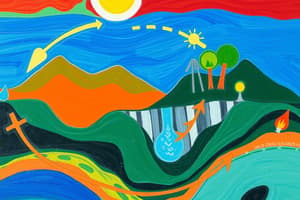Podcast
Questions and Answers
Which of the following best describes how water is recycled in the water cycle?
Which of the following best describes how water is recycled in the water cycle?
- Water only moves from land to the ocean, without returning.
- Water undergoes chemical reactions with soil before returning to the atmosphere.
- Water is transformed into gas and stored in clouds forever.
- Water evaporates, condenses, and precipitates back to Earth. (correct)
What role do decomposers play in the biogeochemical cycles?
What role do decomposers play in the biogeochemical cycles?
- They enhance the growth of living organisms by directly absorbing nutrients.
- They break down dead organisms into raw elements for plant absorption. (correct)
- They eliminate waste products from the environment permanently.
- They create new forms of matter to enrich the soil.
What process allows plants to use carbon dioxide from the atmosphere?
What process allows plants to use carbon dioxide from the atmosphere?
- Transpiration
- Photosynthesis (correct)
- Decomposition
- Fermentation
Which process is responsible for the water in plants turning into vapor?
Which process is responsible for the water in plants turning into vapor?
Which process releases carbon dioxide into the atmosphere as a byproduct?
Which process releases carbon dioxide into the atmosphere as a byproduct?
What happens during the process of condensation in the water cycle?
What happens during the process of condensation in the water cycle?
How does combustion contribute to the carbon cycle?
How does combustion contribute to the carbon cycle?
What is runoff in the context of the water cycle?
What is runoff in the context of the water cycle?
What role do bacteria play in the nitrogen cycle?
What role do bacteria play in the nitrogen cycle?
Which of the following materials are essential to the three main biogeochemical cycles?
Which of the following materials are essential to the three main biogeochemical cycles?
How does evaporation occur in the water cycle?
How does evaporation occur in the water cycle?
Which statement accurately describes the form of nitrogen in the atmosphere?
Which statement accurately describes the form of nitrogen in the atmosphere?
Which statement accurately describes the biogeochemical cycles?
Which statement accurately describes the biogeochemical cycles?
Which statement best describes the relationship between living organisms and carbon?
Which statement best describes the relationship between living organisms and carbon?
Why do fossil fuels contain carbon?
Why do fossil fuels contain carbon?
What is a major consequence of increased carbon dioxide in the atmosphere?
What is a major consequence of increased carbon dioxide in the atmosphere?
What is the primary role of nitrogen-fixing bacteria in the nitrogen cycle?
What is the primary role of nitrogen-fixing bacteria in the nitrogen cycle?
What process in the nitrogen cycle follows ammonification?
What process in the nitrogen cycle follows ammonification?
How do plants utilize nitrogen from the soil?
How do plants utilize nitrogen from the soil?
Which of the following statements about phosphorus is true?
Which of the following statements about phosphorus is true?
What occurs during denitrification in the nitrogen cycle?
What occurs during denitrification in the nitrogen cycle?
What is a key characteristic of rhizobia in relation to plants?
What is a key characteristic of rhizobia in relation to plants?
What can limit the primary productivity of an ecosystem?
What can limit the primary productivity of an ecosystem?
Which process describes the breakdown of organic matter to release raw elements, including phosphorus?
Which process describes the breakdown of organic matter to release raw elements, including phosphorus?
Flashcards are hidden until you start studying
Study Notes
Overview of Biogeochemical Cycles
- Matter can change states and be recycled but is neither created nor destroyed.
- Biogeochemical cycles include the movement of essential elements (water, carbon, nitrogen, phosphorus) between living organisms and their physical environment.
Essential Biogeochemical Cycles
- Key cycles are the water cycle, carbon cycle, and nitrogen cycle.
- All cycles involve transformations and states changes to recycle materials.
- Death and decay provide raw elements back to ecosystems through decomposition.
The Water Cycle
- Water is vital for all living organisms.
- Water exists in different states: vapor, liquid, and solid.
- Evaporation: Liquid water vaporizes into the atmosphere.
- Transpiration: Water evaporates from plants into the atmosphere.
- Condensation: Cooling of vapor forms clouds.
- Precipitation: Water droplets fall as rain, sleet, or snow.
- Groundwater percolation occurs when water seeps into the soil after precipitation.
- Runoff: Surface water flows back to oceans or lakes.
The Carbon Cycle
- Carbon is essential for all life and is present in various forms in living tissues, rocks, atmosphere, and ocean.
- Less than 1% of carbon on Earth participates in the carbon cycle.
- Photosynthesis: Plants, algae, and bacteria use carbon dioxide to create organic molecules.
- Respiration: Living organisms exhale carbon dioxide as a byproduct of cellular respiration.
- Erosion: Dead marine organisms contribute to carbon in the atmosphere through the breakdown of calcium carbonate.
- Combustion: Burning fossil fuels releases carbon dioxide into the atmosphere, impacting the greenhouse effect.
- Fossil fuels form from the sedimentation and transformation of dead organisms under heat and pressure.
The Nitrogen Cycle
- Nitrogen comprises 78% of the atmosphere but most organisms cannot use it directly.
- Bacteria play a crucial role in converting atmospheric nitrogen into usable compounds.
- Nitrogen fixation: Bacteria convert nitrogen gas into ammonia (NH3).
- Ammonification: Ammonia is produced during the decay of organic matter.
- Nitrification: Ammonia is transformed into nitrates and nitrites through bacterial action.
- Assimilation: Plants absorb nitrates and nitrites for protein synthesis.
- Denitrification: Nitrate is converted back into nitrogen gas and released into the atmosphere.
- Rhizobia bacteria live symbiotically with plants, fixing nitrogen in their roots.
The Phosphorus Cycle
- Phosphorus is essential for DNA and RNA synthesis.
- Primarily found in soil and water but does not readily enter the atmosphere.
- Phosphorus is released into the environment from the weathering of rocks.
- Decomposers break down dead organisms, returning phosphorus to the soil.
- Plants absorb phosphates, which are transferred through the food web.
Nutrient Limitation
- Ecosystems can be limited by the availability of specific nutrients.
- Primary productivity is the rate at which producers generate energy, influenced by nutrient levels.
Studying That Suits You
Use AI to generate personalized quizzes and flashcards to suit your learning preferences.




